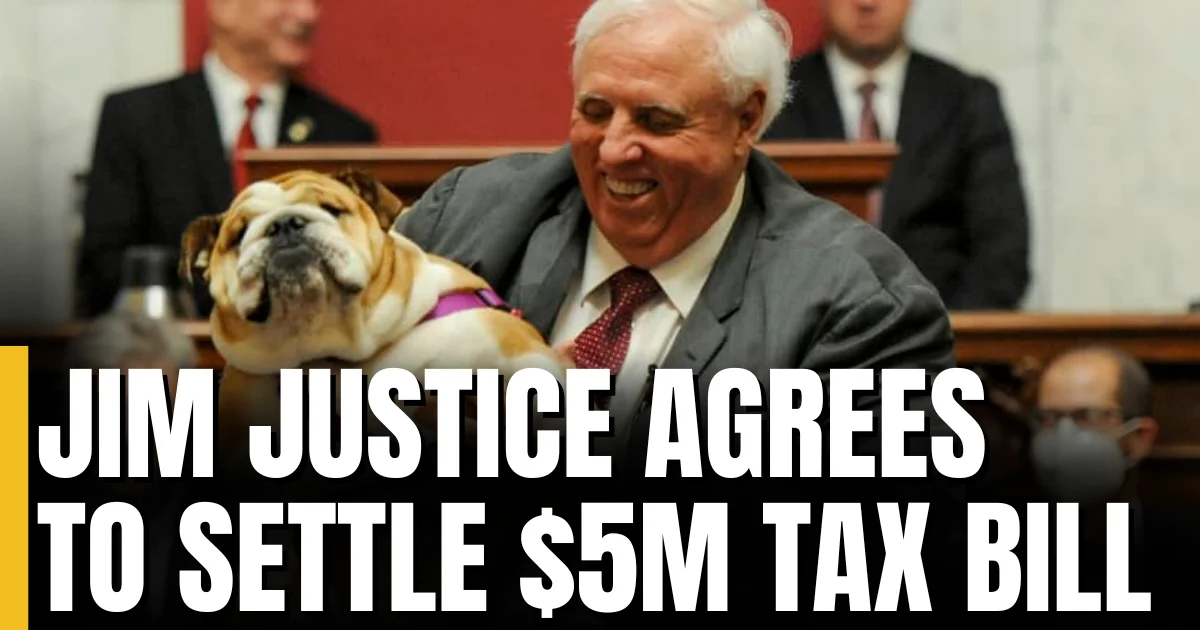US Senator Jim Justice will pay over $5 million in long-overdue taxes. Learn about the settlement details and what this means for the billionaire lawmaker. Read more.
Table of Contents
US Senator Jim Justice Reaches Agreement to Pay Over $5 Million in Long-Overdue Taxes
A billionaire United States Senator has agreed to settle years of outstanding tax obligations. Jim Justice of West Virginia will pay more than $5 million in long-overdue taxes, resolving debts that dogged him throughout his political career and raised persistent questions about financial accountability for elected officials.
The Settlement Agreement Revealed
Senator Jim Justice has formally agreed to pay over $5 million to resolve accumulated tax debts. The settlement addresses obligations that remained unpaid for extended periods.
The agreement covers various tax liabilities connected to Justice’s extensive business holdings. His companies span coal mining, agriculture, and hospitality industries.
This resolution comes after years of legal pressure and public scrutiny. Justice faced mounting criticism over unpaid obligations while serving in public office.
Breaking Down the Tax Debt
The $5 million settlement represents a substantial sum, though Justice’s wealth dwarfs this amount. Understanding what the debt involves provides important context.
Tax debt components include:
| Category | Description |
|---|---|
| Property taxes | Obligations on real estate holdings |
| Business taxes | Corporate liabilities from various companies |
| Penalties | Additional charges for late payments |
| Interest | Accumulated costs from extended nonpayment |
Justice’s business empire includes dozens of companies across multiple states. Tax obligations accumulated across this complex corporate structure over many years.
The settlement reportedly resolves the most pressing outstanding debts. However, some observers suggest additional liabilities may remain unaddressed.
Who Is Jim Justice?
For those unfamiliar with the Senator, Jim Justice ranks among America’s wealthiest elected officials. His biography combines business success with political ambition.
Jim Justice background:
- Net worth — Estimated billionaire status
- Business holdings — Coal companies, farms, resorts
- Previous office — Governor of West Virginia
- Current position — United States Senator
- Party — Republican (previously Democrat)
Justice won his Senate seat after serving as West Virginia’s governor. He switched political parties during his gubernatorial tenure, joining Republicans in 2017.
His wealth came primarily from inheriting and expanding his family’s coal business. Agricultural operations and the famous Greenbrier Resort added to his holdings.
The Long History of Tax Problems
This settlement doesn’t represent Justice’s first encounter with tax difficulties. Financial controversies followed him throughout his political career.
Previous tax issues included:
- Multiple lawsuits — Various entities sued for unpaid obligations
- Court judgments — Legal rulings against Justice companies
- Liens filed — Government claims placed on properties
- Campaign trail questions — Opponents highlighting financial issues
- Media investigations — Journalists documenting payment failures
Justice consistently attributed problems to business complexity rather than unwillingness to pay. He argued that managing numerous companies created occasional administrative challenges.
Critics countered that billionaires have resources to manage their affairs properly. They questioned how someone seeking public trust couldn’t maintain current tax obligations.
Political Implications of the Settlement
Elected officials face heightened scrutiny regarding financial matters. Justice’s tax issues created ongoing political vulnerabilities.
Political considerations include:
| Aspect | Impact |
|---|---|
| Voter perception | Questions about accountability and fairness |
| Opponent attacks | Ready ammunition for political rivals |
| Ethics concerns | Potential conflicts between personal and public interests |
| Leadership credibility | Difficulty advocating fiscal responsibility |
| Party image | Reflects on broader Republican brand |
The settlement allows Justice to claim resolution of longstanding problems. However, the issues’ persistence over many years created lasting impressions.
Future political opponents will likely reference this history regardless of the settlement. Tax problems tend to resurface in campaign contexts.
How This Compares to Average Americans
The contrast between Justice’s situation and ordinary taxpayers’ experiences draws attention. Average Americans face immediate consequences for tax delinquency.
Typical taxpayer consequences include:
- Wage garnishment beginning relatively quickly
- Bank account levies seizing available funds
- Property liens affecting credit and sales
- Potential criminal prosecution for willful evasion
- Limited ability to negotiate extended timelines
Justice’s ability to accumulate years of unpaid taxes while maintaining his lifestyle and pursuing political office strikes many as unfair. The perception of a two-tiered system troubles observers.
Defenders note that complex business situations genuinely create complications. They argue that eventual payment demonstrates good faith regardless of timeline.
The Broader Wealth and Politics Debate
Justice’s tax situation feeds into larger conversations about wealthy Americans in politics. His case illustrates tensions many find troubling.
Broader debate points:
- Do wealthy politicians play by different rules?
- Should candidates face stricter financial disclosure requirements?
- How should voters weigh personal financial conduct?
- Does business complexity excuse payment delays?
- What accountability mechanisms actually work?
These questions extend beyond Jim Justice specifically. However, his high-profile case provides concrete example for abstract debates.
Americans across the political spectrum express concerns about wealthy individuals’ tax compliance. The issue doesn’t divide cleanly along partisan lines.
What the Settlement Means Going Forward
With this agreement reached, several practical consequences follow. Justice’s political and business futures both face effects.
Forward-looking implications:
- Legal pressure reduced — Immediate lawsuit threats diminished
- Political talking point altered — Can claim resolution of issues
- Financial obligations continue — Payment plan must be honored
- Precedent established — Future issues may receive similar scrutiny
- Reputation effects linger — History remains part of public record
The settlement provides Justice with a path forward but doesn’t erase the past. How he handles future obligations will be closely watched.
His Senate career continues with this issue somewhat resolved. However, opponents will likely reference the history in future campaigns.
Reaction From Various Stakeholders
News of the settlement generated responses from multiple interested parties. Perspectives varied based on relationships and priorities.
Stakeholder reactions included:
- Justice’s team — Emphasized resolution and moving forward
- Political opponents — Noted years of avoidance before payment
- Good government groups — Called for stronger accountability systems
- West Virginia residents — Mixed reactions along political lines
- Tax fairness advocates — Highlighted disparities with ordinary citizens
The range of reactions reflects broader divisions about wealthy politicians and tax fairness. Consensus on interpreting the settlement remains elusive.
Transparency and Accountability Questions
This situation raises questions about financial transparency for elected officials. Current systems may inadequately address such concerns.
Accountability considerations:
- Should Senators face mandatory tax compliance verification?
- Do disclosure requirements provide sufficient transparency?
- How should ethics committees address tax delinquency?
- What role should voters play in enforcing accountability?
- Are current penalties adequate for wealthy individuals?
These systemic questions extend beyond Justice’s individual case. His situation highlights potential gaps in existing accountability frameworks.
Reform advocates may use this case to push for stronger requirements. Whether political will exists for such changes remains uncertain.
FAQs
How much does Senator Jim Justice owe in back taxes?
Senator Jim Justice agreed to pay over $5 million to resolve long-overdue tax obligations. This settlement covers various property taxes, business taxes, accumulated penalties, and interest charges connected to his extensive business holdings across multiple states.
Why did Jim Justice have unpaid taxes for so long?
Justice attributed tax payment delays to the complexity of managing dozens of companies across multiple industries and states. Critics argued that his substantial wealth provided resources to properly manage these obligations, questioning why delinquencies persisted for years.
What businesses does Senator Jim Justice own?
Jim Justice owns extensive business holdings including coal mining companies, agricultural operations, and hospitality properties including the famous Greenbrier Resort in West Virginia. These businesses span multiple states and involve complex corporate structures.
Will Jim Justice face any penalties beyond paying the taxes owed?
The settlement includes penalties and interest charges accumulated during the years of nonpayment. Whether additional legal consequences might follow remains unclear. The agreement appears designed to resolve the most pressing outstanding obligations comprehensively.
How does this affect Jim Justice’s political career?
The settlement allows Justice to claim resolution of longstanding financial controversies. However, the history of tax problems will likely remain a political liability that opponents reference in future campaigns. Voter reactions will ultimately determine career impacts.
Conclusion
Senator Jim Justice’s agreement to pay over $5 million in overdue taxes closes one chapter of a long-running financial controversy. The settlement resolves years of accumulated obligations that shadowed his political career.
Questions about fairness and accountability persist despite the resolution. Many Americans wonder why wealthy individuals can delay tax payments that ordinary citizens must pay promptly.
Justice continues his Senate career with this matter somewhat addressed. How voters ultimately judge his financial conduct remains to be seen.
Stay connected for updates on political accountability stories. Share your thoughts on this settlement in the comments below.

